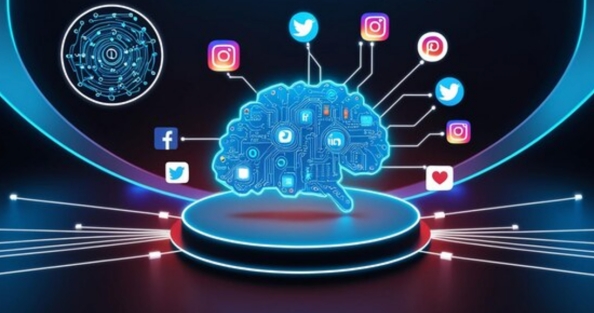The Future of Artificial Intelligence in Social Media
— October 9, 2017The Rise of AI in Social Media
Artificial Intelligence (AI) has become a driving force across industries, particularly in social media. According to Gartner, AI-powered bots were predicted to handle 85% of customer service interactions by 2020. This shift reflects how businesses increasingly rely on AI to streamline processes and enhance user experiences.
In 2017, AI was a hot topic, capturing the attention of businesses and individuals alike. With investment in AI growing by an estimated 300%, the technology continues to redefine the way we engage online. A third of the world’s population uses social media, and AI is revolutionizing how companies communicate with potential customers.
AI’s integration into social media is particularly significant. Platforms like Facebook, Instagram, and LinkedIn rely on AI to understand user behavior, personalize experiences, and optimize interactions. This evolution represents a major leap from the early days of social platforms like Myspace and Bebo, marking a new era of digital communication.
What is Artificial Intelligence?
Artificial Intelligence refers to the intelligence demonstrated by machines. These systems understand their environment and take actions to achieve specific goals. AI spans a wide range of applications, from self-driving cars to voice recognition systems and chatbots.
A notable example is the UK-based tech startup 110%, which combines machine learning with human insight to support individuals in high-pressure work environments. Their approach involves analyzing clients’ language and speech patterns using advanced AI algorithms, providing personalized feedback that enhances self-awareness and decision-making.
In simpler terms, AI works by recognizing patterns, learning from data, and making predictions or decisions. This core functionality makes it invaluable in social media, where understanding user behavior and preferences is essential.
AI in Social Media: Current Applications
Artificial Intelligence is already deeply embedded in social media platforms, enhancing their functionality and value. Its integration balances machine efficiency with human creativity, allowing businesses to better understand and connect with their audiences.
LinkedIn and Bright: In 2014, LinkedIn acquired Bright.com, a job search platform leveraging machine learning. Bright’s algorithms match job seekers with relevant opportunities based on factors such as location, experience, and job descriptions. This acquisition enabled LinkedIn to enhance its job-matching capabilities, helping employers find suitable candidates while improving the user experience for job seekers.
Pinterest and Kosei: Pinterest’s acquisition of Kosei, a data software company specializing in personalized recommendations, marked another milestone for AI in social media. Kosei’s technology enables Pinterest to recognize objects in images and refine product recommendations. This innovation enhances the platform’s ability to deliver relevant content to users, ensuring a tailored and engaging experience.
Chatbots: Automation through AI-driven chatbots has transformed customer service. Unlike humans, chatbots operate 24/7, providing timely responses and improving customer satisfaction. Platforms like Facebook use chatbots with predefined phrases to initiate conversations between businesses and customers. These tools not only save time but also address customer concerns efficiently, enhancing overall service quality.
Facebook’s Facial Recognition: AI-powered facial recognition on Facebook simplifies tagging by identifying individuals in photos. This technology also supports businesses by linking user activity to targeted offers. For instance, Facebook can identify when a user checks into a location and provide them with discounts or promotions in real-time, fostering deeper engagement between brands and consumers.
How Businesses Can Use AI in Social Media
AI provides powerful tools for businesses to optimize their social media strategies. Its ability to analyze data and automate processes allows companies to engage more effectively with their audiences. Here are three key ways businesses can leverage AI in social media:
Match Content to Buyer Personas: Understanding customer personas is crucial for creating effective content. By analyzing prospects’ habits, motivations, and work environments, businesses can craft personalized social media campaigns. AI tools can help businesses achieve a 171% increase in marketing revenue by aligning content with user preferences. Personalization fosters stronger connections with audiences and improves campaign success rates.
Leverage CRM Tools: Customer Relationship Management (CRM) tools like ActiveCampaign use AI to track and tag user behavior. Businesses can segment their audiences based on actions and preferences, delivering targeted messages that address specific needs. For example, assigning tags based on user engagement allows companies to prioritize leads and tailor their outreach efforts. This strategic use of AI ensures efficient resource allocation and better outcomes.
Engage in Real-Time: Social media thrives on immediacy, and AI helps businesses maintain a real-time presence. Automated tools enable companies to respond promptly to user interactions, keeping conversations dynamic and relevant. Consistent engagement across platforms reinforces brand identity and fosters trust among audiences. AI also enhances storytelling by delivering content that resonates with users in the moment.
The Role of AI in Vietnam’s Tech Scene
Vietnam’s growing tech industry has embraced AI as a transformative force. Companies leverage AI for web application development and mobile development, offering cutting-edge solutions to global clients. Outsourcing firms in Vietnam increasingly use AI to streamline processes and deliver cost-effective services. This integration highlights the country’s commitment to innovation and its role as a leader in AI-powered solutions.
The Human-AI Balance
While AI offers immense potential, it is important to maintain a balance between technology and human interaction. AI excels in analyzing data and automating tasks, but it cannot replace the authenticity of human connections. Businesses should use AI as a tool to enhance their efforts, ensuring that their interactions remain personal and meaningful.
The future of AI in social media promises continued growth and innovation. By combining machine intelligence with human creativity, businesses can create engaging and impactful experiences for their audiences. The key lies in embracing AI while preserving the human touch that defines successful relationships.
What are your thoughts on AI’s role in shaping social media? Let us know in the comments below.





